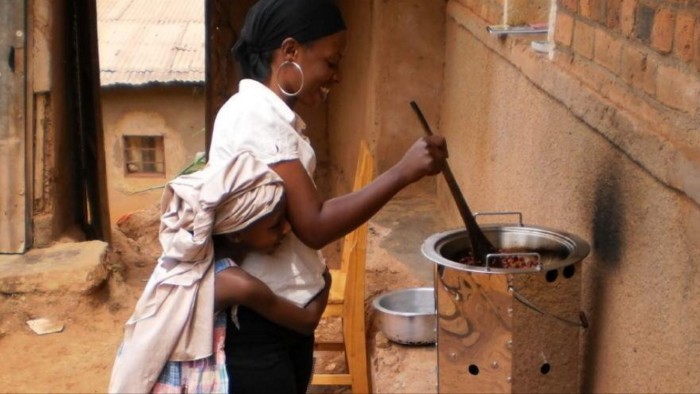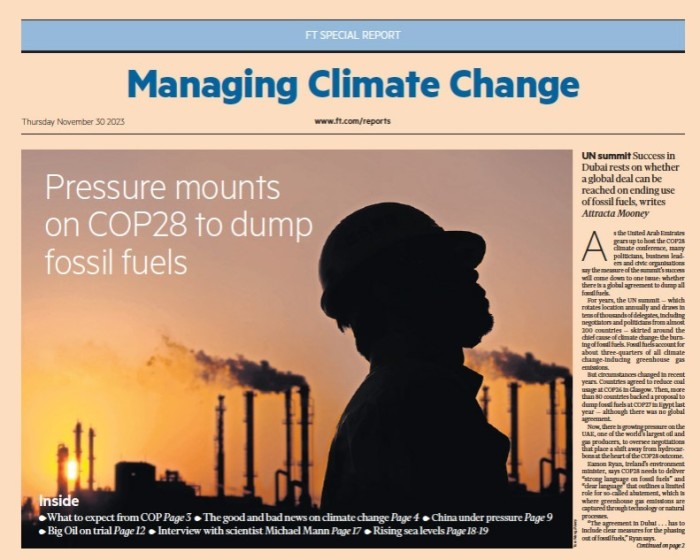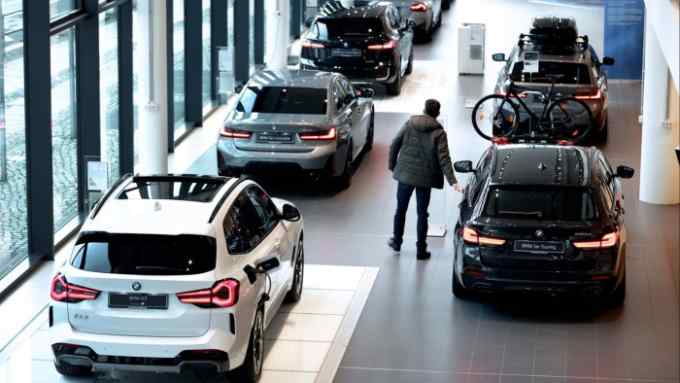UN-based checks on carbon credits face critical test

Roula Khalaf, Editor of the FT, selects her favourite stories in this weekly newsletter.
The UN system for avoiding flaws in the controversial issue of carbon credits is now facing a critical test — after a German carbon-offset non-profit organisation secured a clearance label from a Swiss registry group.
The question of how to trade carbon credits in a credible and effective way — in order to help governments hit national emission reduction goals — has long been a difficult one. And it remains on the agenda at the UN COP28 climate summit in Dubai, this month.
A centralised system to allow companies and countries to exchange carbon credits was created by the 2015 Paris Agreement, under what is known as ‘Article 6’, and was further developed at the Glasgow summit in 2021.
But, in an unusual move, Rwanda’s government has now guaranteed that it will forfeit the right to claim certain carbon emission reductions in its national decarbonisation target — a big change in the way the market has worked so far.
Rwanda extended this guarantee by using a “corresponding adjustment” tool created by the UN. The tool was designed to ensure the estimated cuts in carbon dioxide entering the atmosphere were not double-counted by the company buying the corresponding carbon credits and the country where the project takes place. This enabled Swiss carbon registry platform Gold Standard to certify that more than 54,000 credits for German non-profit Atmosfair, worth $327,000 at recent market prices, meet the rules of the nascent UN system.

This article is part of an FT special report on Managing Climate Change
Gold Standard says these will be the first such credits in voluntary markets to receive a government guarantee against double-counting.
In a letter seen by the FT, Juliet Kabera, director-general of the Rwanda Environment Management Authority, wrote to Atmosfair last month, authorising its use of certain carbon reduction credits by companies or other countries, and promising not to use the emission reductions to “demonstrate achievement” of its own climate goals.
Atmosfair issues offsets designed to compensate, in theory, for emissions from a range of polluting activities, including flying. One of its projects, backed by the Rwandan government, makes and distributes cookstoves, which it says require 80 per cent less wood than standard cookstoves. It estimates that this saving equates to 300,000 tonnes of CO₂ annually.
Rwanda’s annual greenhouse gas emissions were 2.63mn tonnes in 2018, with livestock being the biggest source. It has pledged to cut emissions by at least 16 per cent by 2030.
But the Gold Standard registry is now among those in the carbon credit industry to have come under scrutiny for schemes it has endorsed. Jonathan Crook, a policy expert at non-profit Carbon Market Watch, says the guarantee from Rwanda should allow the credits to fetch a higher price than equivalent credits in the voluntary markets.
However, certain aspects of the accounting framework for internationally traded credits must still be resolved by UN bodies, he notes, creating uncertainty around demand for credits that are given an ‘Article 6’ label.
Unresolved questions include whether credits issued with an Article 6 label could be revoked by the country if they are found not to meet certain integrity tests.
The quality of carbon credits generated by clean cookstoves has been questioned by some scientists because they are issued for so-called reduced emissions, based on hypotheticals about how many trees would have been cut down if the stoves had not been used. It has also proved difficult to monitor how heavily stoves are actually used.
Broader questions from scientists about the methodology behind carbon credits in voluntary markets — particularly those linked to the avoidance of deforestation — have also dented confidence in the concept of offsetting.
“Carbon credits are not something you can touch — they are based on trust — so we put a huge amount of effort into verifying that the things that we claim are happening are actually happening,” says Jamie Ballantyne, director of communications at Gold Standard.
It is estimated that, out of 2.3bn people who cook on open fires using charcoal or wood, 950mn live in Africa, according to a McKinsey report. The World Health Organization says that some 3.2mn people a year die prematurely of diseases attributable to household pollution from open cooking fires.
The world’s largest carbon-offsetting company, South Pole, has previously bought credits that were certified by Gold Standard, according to a database maintained by the registry. These include credits linked to the provision of safe drinking water in Rwanda, which were meant to reduce carbon emissions from burning firewood to boil water.
South Pole chief executive Renat Heubergerstepped down this month after allegations of the overstatement of the amount of carbon emissions saved by a separate project, aimed at reducing deforestation at a site in Zimbabwe. South Pole said in October it was terminating its contract with the developer of the project and had been working on its “group-wide quality control and due diligence processes”.
Climate Capital

Where climate change meets business, markets and politics. Explore the FT’s coverage here.
Are you curious about the FT’s environmental sustainability commitments? Find out more about our science-based targets here

Comments